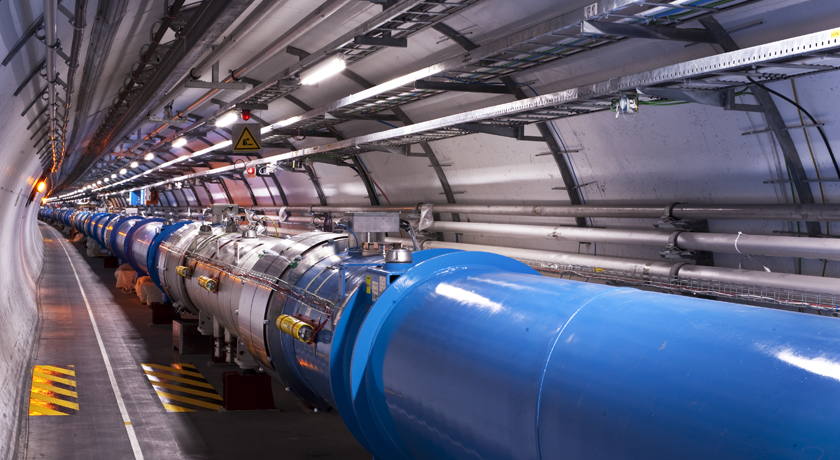
The LHC normally functions at 13 TeV, making it the most powerful particle accelerator on Earth. (Image: CERN)
The search is on for miniature black holes at the Large Hadron Collider (LHC), the world's most powerful particle accelerator, located in Geneva, Switzerland. The University of Alberta's Dr. Douglas Gingrich is leading the search for these quantum black holes. He believes that if they are detected they would be evidence of extra dimensions in space, and give new insight into the formation of our universe.
"These micro black holes are still black holes like astronomical black holes, but behave very differently, he says"
A black hole is an object so dense and with such a high gravitational pull that nothing can escape it, not even light. Any object or radiation that passes too close to the edge of the black hole, across an area called the event horizon, would be pulled inside. The most well-known type of black hole is the astronomical kind, found in the centers of galaxies. These are thought to be formed by the gravitational collapse of giant stars. When the internal pressure of a star is not enough to offset its own gravity, it will collapse in on itself to reach very high densities, creating a black hole.
During the LHC's construction, much press was given to the theory that the accelerator would be responsible for the formation of rapidly expanding cosmic-type black holes. If this were to happen, the effects would be devastating, and spell the end of our solar system. This theory certainly makes for good science fiction, but it is very far removed from science fact. It is impossible for the LHC to create this type of black hole on Earth, and Gingrich wants to make this very clear. "An astronomical black hole cannot be formed in a particle accelerator because the energy required would be too high, and we have no foreseeable technology to build such an accelerator."
The energy produced at the LHC is measured in teraelectronvolts (TeV). The LHC normally functions at 13 TeV, making it the most powerful particle accelerator on Earth. However, as Gingrich notes, "an astronomical black hole can only be formed if you have energies of about 1015 TeV. This is about 14-15 orders of magnitude larger than the energy available at the LHC." Indeed, high-energy cosmic rays have long impacted the Earth at energies higher than what the LHC achieves, all without sparking a cataclysmic singularity.
Quantum black holes, much smaller than their cosmic brothers, are the kind some researchers at the LHC are hoping to find.
The formation of quantum black holes proceeds very differently from the creation of astronomical ones. It is theorized that if the universe contains dimensions other than the four observable ones (three spatial dimensions, one temporal), then the energy required to form these quantum black holes would be achievable in the LHC. The collision of two particles of sufficient mass and energy would form a quantum black hole, which would then immediately decay, producing a characteristic spray of particles that would be seen by the instruments at the LHC.
The physics surrounding quantum black holes is relatively new, with theories about their existence only going back about 16 years. This so-called 'new physics' proposes extra dimensions in space, and makes gravity a much more significant force in the quantum world. "Philosophically, it would give us a rather drastically different view to know we live in a world of more than four dimensions. It would no doubt spawn lots of curiosity and idle thought about the nature of these extra dimensions," says Gingrich.
The LHC has been shut down since 2013 for a two-year upgrade, and began ramping up beam operations again just last month, so new physics might be just around the corner.